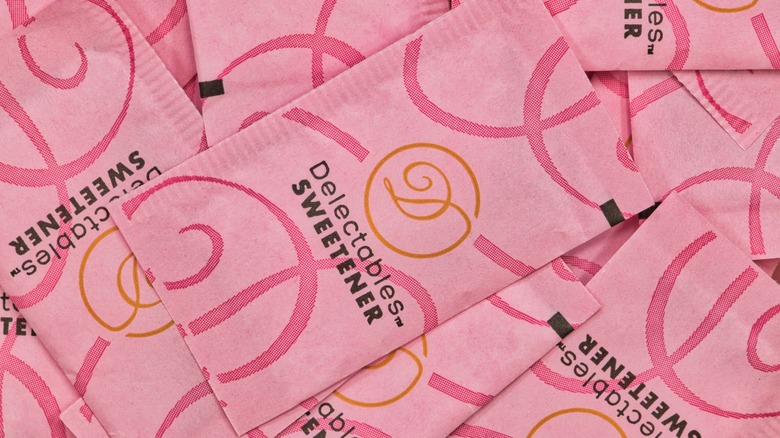New Study Suggests A Link Between Artificial Sweeteners And Cardiovascular Disease
There has been plenty of debate over the health risks of artificial sweeteners, but new research is suggesting that they can in fact cause health problems. According to a study published in the BMJ, consuming large amounts of aspartame, a popular artificial sweetener, may increase your risk of having a stroke. Aspartame is found in the sweeteners Equal and NutraSweet, as well as in diet soda and foods like cereal, yogurt, and candy (via NBC News). The study also found that people who consumed large amounts of sucralose, another artificial sweetener, had an increased risk of developing coronary heart disease. Sucralose is found in sweeteners like Splenda and can also be found in foods like baked goods, canned fruit, flavored yogurt, and ice cream.
A recent controlled trial done on 120 adults also found that those who consumed artificial sweeteners experienced altered stool and microorganisms in the mouth (via WebMD). While more research is necessary to confirm the effects of artificial sweeteners, there is good reason to limit them in your diet when possible.
Are artificial sweeteners really that bad?
This new research is important to keep in mind when consuming products that contain aspartame and sucralose. However, it is also important to take all evidence into account when making food choices. According to Mayo Clinic, there is still little evidence to suggest that a moderate consumption of artificial sweeteners approved by the FDA can cause serious health problems. Because they contain no calories, artificial sweeteners can also help people lose weight when used as a substitute for sugar-filled foods.
Of course, most experts agree that a diet high in artificial sweeteners is not ideal. Both the American Heart Association (AHA) and American Diabetes Association (ADA) advise limiting these sweeteners in your diet (via Harvard Health Publishing). There are five different types that have been approved by the FDA: saccharin, acesulfame, aspartame, neotame, and sucralose, and it's recommended that you only choose these sweeteners when you are going to consume artificial sweeteners. While subbing artificial sweeteners for real sugar may help with weight loss in the short term, it may actually contribute to weight gain in the long run. This is because people consuming artificially sweetened foods may think they can splurge on sugary treats more often as a reward and quickly reverse their progress. In the end, consuming all foods in moderation, including artificial sweeteners and natural sugar, is the best way to have a healthy diet.


